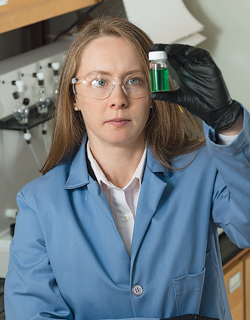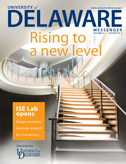Engineering projects gain high-level support


RESEARCH | Two assistant professors of engineering have received Faculty Early Career Development Awards from the National Science Foundation (NSF) to support their research, one focusing on making computer chips more reliable and the other investigating connections between cells and disease and repair in the body.
The NSF describes the program as its most prestigious award to junior faculty.
More reliable and efficient chips
The unending quest for new electronics applications and greater computational power is pushing researchers to produce computer chips that perform better and consume less power. However, as chips shrink—and more devices are placed on each—they become increasingly unreliable, limiting or hampering a system’s ability to run lengthy applications.
Chengmo Yang, assistant professor of electrical and computer engineering, will use her five-year, $449,541 NSF award to develop resiliency solutions that can help computer systems overcome progressively diverse types of hardware failures.
The new funding will enable her to design and evaluate new architectural and system-level solutions to boost resiliency in computer systems and to develop new ways to optimize a computer’s performance, energy and reliability.
“Future computer systems are expected to experience continuous faults, across all levels from hardware to software applications, raising critical concerns about the impact of intermittent faults that occur frequently and irregularly,” she says.
Previous approaches have included adding system redundancies, such as having the computer perform a computation twice and comparing results to ensure accuracy.
“Doing the computation twice means double the energy expenditure,” says Yang, who instead proposes adapting the execution conditions to improve efficiency while also controlling costs. Her approach includes creating a feedback loop within the system to improve the devices’ reliability over time through adaptive “work-arounds.”
Cells, signals and disease
April Kloxin, assistant professor of chemical and biomolecular engineering, will use her $500,000 NSF award to study the extracellular signals that regulate tissue stability, disease and repair in the body.
Understanding the complex interplay between cells and their external environment is an essential part of designing therapeutic approaches to prevent the progression of disease or to direct tissue regeneration, she says.
“Biomimetic materials—materials that mimic the biology of natural tissue—have emerged as a key tool in understanding the role of extracellular signals in cell behavior,” says Kloxin, who will focus her research on pulmonary fibroblasts.
Fibroblasts are cells that naturally occur within all parts of the body. They produce collagen, which is organized into fibers, and become activated when repair is required—enabling a wound to heal, for example.
“Things become problematic, however, when these cells spontaneously ‘turn on’ for unknown reasons,” Kloxin says.
Once in this state, fibroblasts produce excessive protein and enzymes, break down existing tissue and produce new tissue that is stiff and causes perpetual scarring. In the lung, this process can lead to pulmonary fibrosis, loss of tissue function and ultimately death.
Kloxin plans to create synthetic hydrogels that mimic the biology of natural lung tissue in the laboratory in order to study why and how these cells sometimes activate.
Article by Karen B. Roberts, AS90
Editor’s note: NSF Early Career awards are announced periodically throughout the year, and UD faculty members are always well-represented. So far this year, awards also went to Erik Thostenson, assistant professor of mechanical engineering, who was highlighted in the last issue of the UD Messenger, and Donald Watson, assistant professor of chemistry and biochemistry, whose work will be featured in our next issue.






